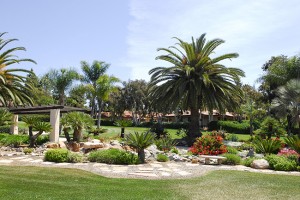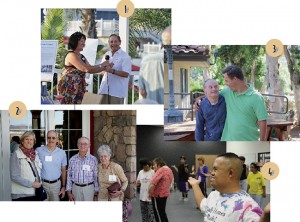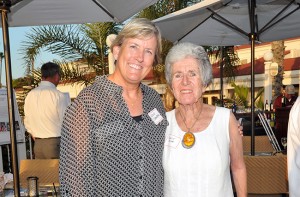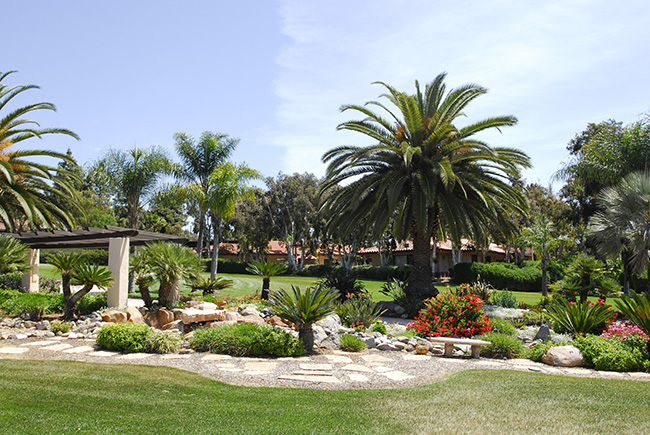The Walter Fitch III Community Center at Noah Homes in Spring Valley is the only building bearing its benefactor’s name — but it was the Coronado man’s fortune and his friendship with local Kathryn Papaleo (formerly Jennings) that turned the idea of a group home for adults with developmental disabilities into a thriving reality.
“It all began right here in Coronado,” said Francette Roeder, an ambassador for Noah Homes, and whose husband, Bernie, was Fitch’s nephew. Between 1970 and 1972, Papaleo, one of six siblings born in Coronado (and whose father was the personal caddy to John D. Spreckels), was a Benedictine nun teaching seventh grade at Sacred Heart when Fitch’s father, Walter Fitch, Jr., fell ill. A long-time family friend, Papaleo would sit at Fitch Jr.’s bedside at his home on Ocean Boulevard and read to him. And, under Papaleo’s direction, the Sacred Heart children’s choir sang at his funeral. “Uncle Walter greatly appreciated the time and devotion Kathryn showed to his dad,” Roeder said.
In the years that followed, Papaleo directed her ministry toward the developmentally and intellectually disabled population. Serving as a special education consultant for the San Diego Catholic Diocese and later as director of services for people with disabilities for the Catholic Charities Diocese, Papaleo began to recognize the need for assisted living homes for these people. “In the ’70s, these disabled men, women and children were segregated from the rest of society. But they had so many gifts — and they needed to know how wonderful they were. My dream was to create a community that would reflect to them their gifts,” Papaleo said.
In 1979, she began brainstorming around San Diego with a group of Catholic parents searching for a way to build a faith-based home where their disabled children could live enriching lives — and thus was the genesis of Noah Homes. “We chose the notion of Noah’s Ark because the community on the ark was one of great variety. It was also a symbol of hope, safety, and protection,” Papaleo said. “We wanted to create a place where parents could bring their sons and daughters, knowing they’d be safe and protected, but also growing, thriving, and becoming all they could become.” The group began fundraising, but they needed more help.
Fitch, who never married or had children, had made a fortune as the founder of Texas Oil and Gas — and had become a generous philanthropist. “Walter was a very wealthy man,” Roeder said. “But he gave his money around the world. And he always gave anonymously or in the name of his parents.”
It’s fitting, then, that when Papaleo — who had been so dedicated to Fitch’s father at the end of his life — came to Fitch in 1982 with the idea of building Noah Homes that he was happy to get on board. “When Sister Kathryn came to him,” said Roeder, “he basically gave her a blank check.”
“If it hadn’t been for our Coronado family connections, this wouldn’t have become a reality,” Papaleo said.
They searched for a plot of land and purchased eight acres on Campo Road in Spring Valley. “It was a large plot of land at a good price,” said Molly Nocon, Noah Homes’ CEO. In 1983 Noah Homes’ first home, Casa de Felicidad, was built to house six residents with a staff of four people. “Three of the first six residents still live here today,” said Nocon. (Of the other three, one moved because her family moved and the other two have died.) “I knew if I could create an environment of peace and beauty, these people could see the beauty and giftedness in themselves and become contributors to the larger community,” Papaleo said. “And Noah Homes became that.”
Papaleo and Fitch didn’t stop there. “The first residents at Noah were like Walter’s children,” Roeder said. “He had a pool at his home and would have them over to swim. He even took them and their caretakers to France, first class!” Nocon explained that Fitch, whom residents called “Uncle Walter” remained involved with the home as long as he was able. (He died in 2002 from Alzheimer’s at the age of 86.) Papaleo ran the first home and those that followed until her retirement in 2006. (Papaleo left the convent in 2000 and three years later married the homes’ staff psychologist, Dr. Stephen Papaleo.) During her tenure, Noah Homes grew to 65 residents and 40 caretakers; today there are 70 residents in eight houses on 11 acres of scenic land, including a large memorial rock garden, sprawling lawns, and an orchard with
43 fruit trees.
Noah Homes’ ties to Coronado include Peter Ferrantelli, who owns the building on the corner of Orange Avenue and Tenth Street containing Clayton’s Coffee Shop, Holland’s Bicycles and Danny’s Palm Bar & Grill, and is board chair of the Noah’s Ark Angel Foundation, a charitable foundation with the sole purpose of supporting the work of Noah Homes.
Noah Homes has set a standard for care for the developmentally disabled population. “There may only be 70 people living here, but this is a best practices model for the nation, and the more the community can support us, the more change we can make,” Nocon said. “We will not skimp on quality; we’ve also always operated in the black, and will not build with debt.” Funds from its summer “Brewfest” fundraiser in 2014 also allowed the facility to install extensive solar paneling; the property now operates 100 percent off the electrical grid.
Noah Homes is currently building two groundbreaking memory-care homes for people with disabilities. “Thirty years ago, people with these kinds of developmental disabilities were living into their 30s,” said Nocon. “Today, they’re living into their 60s and 70s, so for the first time this population is dealing with age-related issues like Alzheimer’s or other dementia. It’s becoming an epidemic.”
Recent research has revealed that the 21st chromosome, which is doubled in people with Down Syndrome, is also readily linked to the development of Alzheimer’s, meaning it’s almost guaranteed that individuals with Down Syndrome will develop the age-related disease. The two new memory-care homes, slated to open early 2017, will each have room for 10 residents and will be staffed with people specifically trained to deal with age-related issues in people with developmental disabilities.
There is no waiting list for prospective residents of Noah Homes; rather an “interest list” places residents based on their capacities, personalities, and needs — both theirs, and those of the residents they’d share a home with. Residents go off-site every weekday, whether to jobs at places like Pizza Hut, Vons and The Salvation Army, or to organized artistic, musical, and physical activities at facilities such as the nearby Saint Madeleine Sophie’s Center. In the evenings, Noah Homes folks gather for dinner around large dining room tables in each home. Residents’ photographs are hung above the mantle in the adjacent, comfortable living room, and bedrooms reflect individual tastes with decorations such as Taylor Swift posters, family photos, and treasured stuffed animals.
“This is really a neighborhood, not an institution,” Nocon emphasized. Roeder agreed: “It’s such a special place. And while it’s not big enough to take care of everyone with these needs, it’s a model for the whole country.
“It’s a place where miracles happen, and it started right in our own little community of Coronado.”




